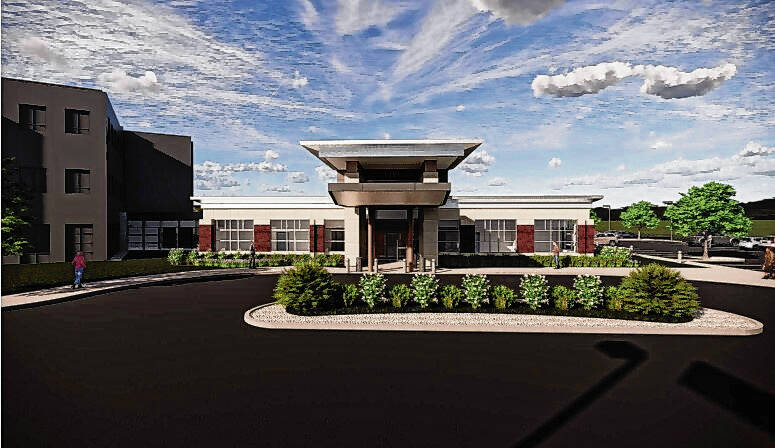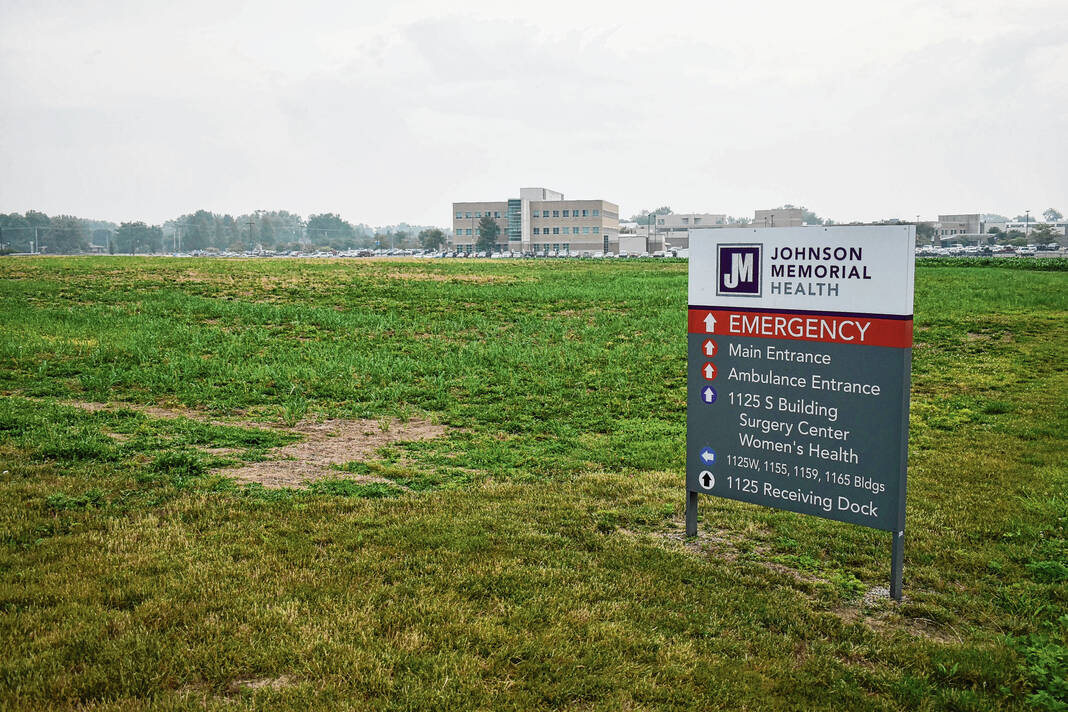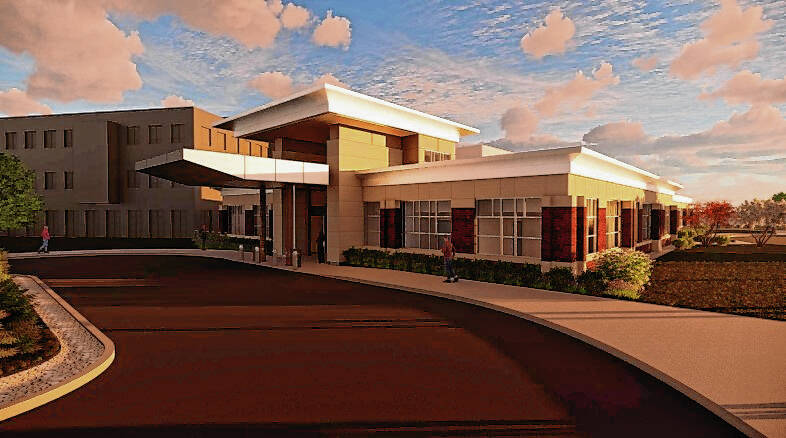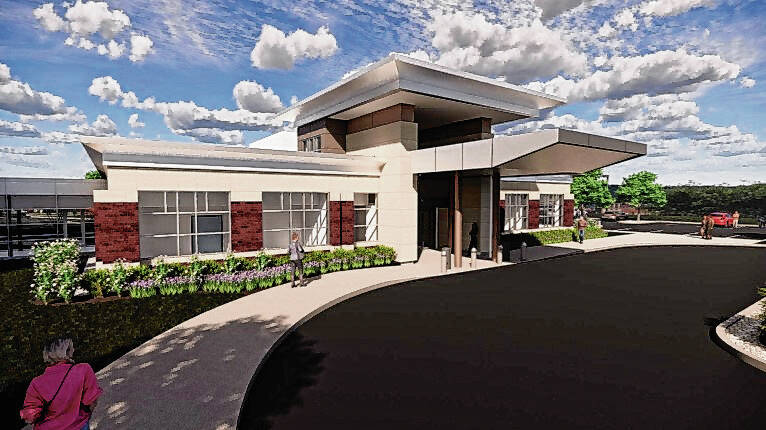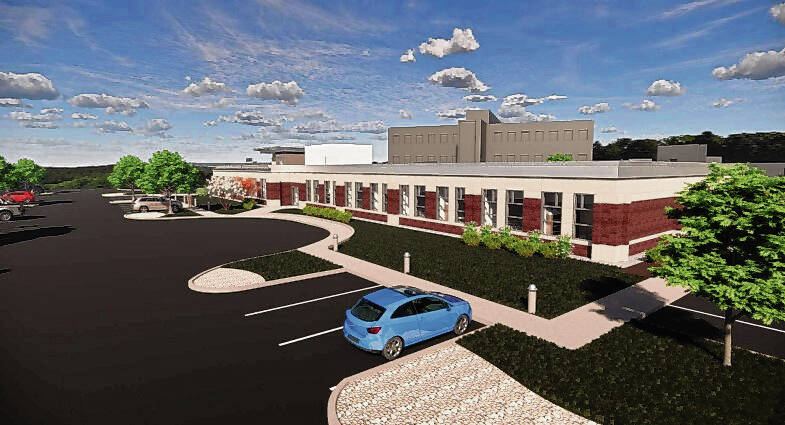Over a year in the making, plans for a new mental health facility in Johnson County are coming to fruition.
Johnson County government plans to spend around $11 million in federal pandemic relief funds to construct a 17,400-square-foot behavioral psychology wing at Johnson Memorial Hospital in Franklin.
This is a long-awaited project for the county, one officials had been talking about for years, but never had funds to get it moving. It started to become more of a reality in 2021 when the county received $31 million from the American Rescue Plan Act, or ARPA.
“(Mental health) it’s like the 800-pound elephant in the room,” Johnson County Commissioner Kevin Walls said. “Everybody has been aware of this situation, but nobody has been willing to attack it because it’s so unpredictable.”
The Johnson County ARPA Committee, which is made up of the three commissioners and three county council members, last summer officially got the ball rolling on the project. They earmarked roughly $8 million at the time for this building and later upped it to about $10 million.
As part of initial public discussions, committee members talked about how the county government should not be the entity running the mental health facility. They wanted to instead bring in a private health care provider.
Enter Johnson Memorial Health, which also was having discussions about how to better care for residents’ mental health.
“We’re dedicated to improving the health of this community and I said to my board one night, ‘I don’t feel we’re meeting the mental health needs of this community, because that is part of the health care … we need to do more,’” said Dr. David Dunkle, president and CEO of JMH.
Mental health issues are one of the top transfers out of the hospital’s emergency department, along with acute cardiac events, Dunkle said. In January, mental health made up 30% of transfers.
An unmet need
The building will become a new wing of the hospital on its west end. It is set to be constructed on a three-acre plot of land there that JMH already owns.
When planning this project out, it made the most sense to connect this building to the existing hospital because the basic health care infrastructure is already there, Dunkle said. It gives access to the hospital’s linens, nutrition and other services there.
Plans show the wing will be a 25-bed inpatient facility, with care provided by Johnson Memorial and Horizon Health, a behavioral health management provider JMH partners with.
“What we look at in the county, one of the largest current unmet needs is inpatient beds. And so that’s going to be the focus of this project,” Dunkle said.
Johnson County lacks behavioral health centers, with Valle Vista Health System being the only inpatient and outpatient facility locally. Many times, residents of the county are being transported out anywhere from Indianapolis to Bloomington to sometimes Hancock County, because beds are hard to come by, Walls and Dunkle said.
“I don’t look at this as a competition with the other providers. I look at it as an asset to the other providers because they’re overwhelmed,” Walls said. “But the bottom line is, it needs to be addressed. And we’re addressing it.”
And when a patient has to go out of county, they’re also further away from their family and support systems. A goal with this project is to fill that gap, so residents don’t have to go far for the care they need.
“We know that emotional support is so important, as well. So being able to keep our patients here in the county where their families are, I think is what this is about too,” Dunkle said.
With a big expansion like this, JMH plans to hire more staff and providers, which will bring more jobs to Franklin. Exact details on how much staff they will need and what other costs the health network will incur are still being discussed, Dunkle said.
The idea is to mostly serve Johnson County residents, but they also won’t deny patients from other counties. That was a tricky part in planning, Walls and Dunkle said, because they don’t want to be in a place where two-thirds of the beds are taken up by Indianapolis residents, for example, but they also don’t want to deny people who need help. Facilities in other counties have already been taking in Johnson County residents for years.
“There’s no good answer … just because they are from Marion County, we’re not going to turn them away, but we don’t want to turn into a Marion County facility,” Walls said.
There is room for expansion as part of the building plans. So if beds do fill up quickly and stay full, expanding the wing is an option, Dunkle said.
A public-private partnership
The county is taking on the bulk of the expense paying for the building, which just received bids that range in cost between $10.4 million and $10.7 million. Under this partnership, the county will continue to own and maintain the building after its finished, while JMH runs the operations.
The building wouldn’t be a cost JMH could bear on its own or the county could have taken on without ARPA funding, Walls and Dunkle said.
The mental health project is the biggest and most expensive project the county is taking on with its ARPA funds, taking up over a third of the cash they received. It has been the top project priority since the beginning, Walls said.
“Facts are facts. The numbers that they provide with mental health, I see it in the jail. I see it at the hospital,” Walls said. “You can’t deny that it is one of the greatest needs of the county.”
A partnership and project like this is a first for the county and JMH. They’ve been methodical with the process, spending the last year working on it, Walls said.
Inpatient behavioral health care is a big task and a big financial risk to take on as a health care provider, Dunkle said.
“We’re gonna have to fill it and make it so it’s not losing money,” Dunkle said. “Because obviously the unfortunate dirty side a lot in mental health is, it’s not incredibly profitable.”
However, Dunkle and Walls are optimistic about the project, the partnerships and its capability to be an example other communities and health care providers can follow.
“It’s not like we’re reinventing the wheel … I think as long as we keep the patient at the center of our focus, everything works out fine,” Dunkle said.
Help for Crisis Intervention Team
Johnson County has already been taking some steps to help those in mental health crisis with the creation of the Crisis Intervention Team at the Johnson County Sheriff’s Office.
CIT deputies respond to mental health crisis calls throughout the county. These calls vary widely, they could be mental illness, a suicide, a suicide attempt or a juvenile problem.
Last year, CIT deputies responded to 246 calls in the county. Many of those require finding a place for a resident to receive help or a place for them to stay, which can be hard to find, Sheriff Duane Burgess said.
“There’s times that we can have mental risks, where an individual needs to be transported to some health facility. And here we are calling around hearing, we don’t have a bed available anywhere,” Burgess said.
Because of this, the behavioral health building at Johnson Memorial will become a huge asset for the sheriff’s office and CIT, he said. It will be easier to call to ask for help with a facility that is local.
“We’ll have it here in our backyard, you know, so we’re not driving to … Indianapolis trying to get a bed,” Burgess said. “… I don’t have numbers of the presidents of those other hospitals … but you know, I’ve got Dr. Dunkle’s number, and I can call him.”
Burgess said an investment like this is “long overdue” in Johnson County, and he believes the right people are involved in this project to make it work.
Next steps
Plans for the behavioral psychology wing are not quite at the finish line. The funding needs to be formally appropriated and the Board of Commissioners needs to vote on a bid award.
The plan is to award the bids at the next commissioners meeting on July 10, and also hold an ARPA committee meeting in July to officially appropriate the $11-12 million for the project. The commissioners and county council members have been on board with the project, so the funding approval is likely to pass both bodies after making it out of the ARPA committee, Walls said.
Walls and Dunkle are excited, but they aren’t completely celebrating yet, they said. At least not until the bids are awarded and funding is officially approved.
“Between Dr. Dunkle and I, we’ve been cautiously optimistic … because it is a very large project. And there are a lot of moving parts,” Walls said.
If everything goes accordingly, the building is expected to be finished sometime in the third quarter of next year.
“The big thing is, and again … I’m still trying to not get too excited from a clinician standpoint,” Dunkle said. “For me, it’s very simple, this is one of the biggest health care needs out there in the community.”


